On December 3, 2024, French media outlet Mediapart revealed a significant piece of information – the Organised Crime and Corruption Reporting Project (OCCRP) is funded by billionaire George Soros, known for his disruptive influence on economies and political systems, and the United States Government. This revelation sent shockwaves through Bharat’s political landscape, as OCCRP has been at the forefront of reports targeting the Indian conglomerate Adani Group.
Anathema Towards Bharat
The controversy deepens as Soros had publicly expressed his disdain for both Prime Minister Narendra Modi and industrialist Gautam Adani. The timing of this disclosure is particularly significant, given that the opposition Congress Party has relied heavily on OCCRP’s reports to frame its political narrative against Modi and Adani.
Salient Points of BJP’s PC on Rahul Gandhi–George Soros connection
- “An article in the French newspaper ‘Mediapart’ claims that the plot against India involves a triangle consisting of American billionaire George Soros, the news portal OCCRP and Rahul Gandhi, the Congress MP and Leader of the Opposition in the Lok Sabha”
- “On July 1, 2021, OCCRP published an article aimed at undermining the Indian vaccine Covaxin and on July 2, Congress held a press conference targeting the government and Covaxin. OCCRP directs and Rahul Gandhi follows”
- “OCCRP has repeatedly targeted India’s top industrialists with unfounded reports, aiming to disrupt the economy, crash stock markets, and undermine investor confidence. The goal was to stir public discontent and push for a regime change”
- “Whenever reports against the country emerged, Rahul Gandhi targeted the government. After OCCRP’s Pegasus report on July 18, 2021, he held a press conference on July 19, stirring disruption in Parliament”
- “When the ED questioned Sonia Gandhi and Rahul Gandhi in the National Herald case, OCCRP published an article alleging the proceedings were politically motivated. Despite accusations of embezzling ₹5,000 crores, the US-based OCCRP effectively exonerated them”
- “When OCCRP faces a setback, Rahul Gandhi shows concern, and when Rahul Gandhi faces challenges, OCCRP reacts similarly. While OCCRP and Rahul Gandhi may look different, their souls are one”
- “George Soros and Rahul Gandhi are considered two faces of the same ideology. They are “two bodies and one soul.” The agenda of Soros is the same as that of Rahul Gandhi”
- “During his US visit, Rahul Gandhi met Bangladeshi journalist
Mushfiqul Fazal Ansarey, linked to OCCRP and known for publishing
anti-India articles” - “During the 2020 Delhi riots, Anand Maganale, an OCCRP journalist and close associate of Rahul Gandhi, allegedly brought funds from China and handed them to Sharjeel Imam, a key figure in the riots”
- “When an organisation receives most of its funding from a single source, inevitably, the organization cannot remain neutral. OCCRP gets the majority of its funding from George Soros and the Deep State, which is why it advocates for their interests”
Mediapart’s exposé provides a broader context. Soros’s funding of OCCRP, which has published fictions against PM Modi and Adani, indirectly fuels Congress leader Rahul Gandhi’s attacks on the two figures. Critics argue that this suggests a larger pattern of foreign interference aimed at destabilising Indian politics and markets, with Soros playing a key role in providing the “ammunition” for these campaigns. The work done by Mediapart is truly commendable, especially considering the European Union’s close ties with George Soros himself. At Only Fact, we have long been unravelling the dark and intricate web spun by Soros, his network of organisations, and his associates. Time and again, we have highlighted the far-reaching influence of this shadowy empire.
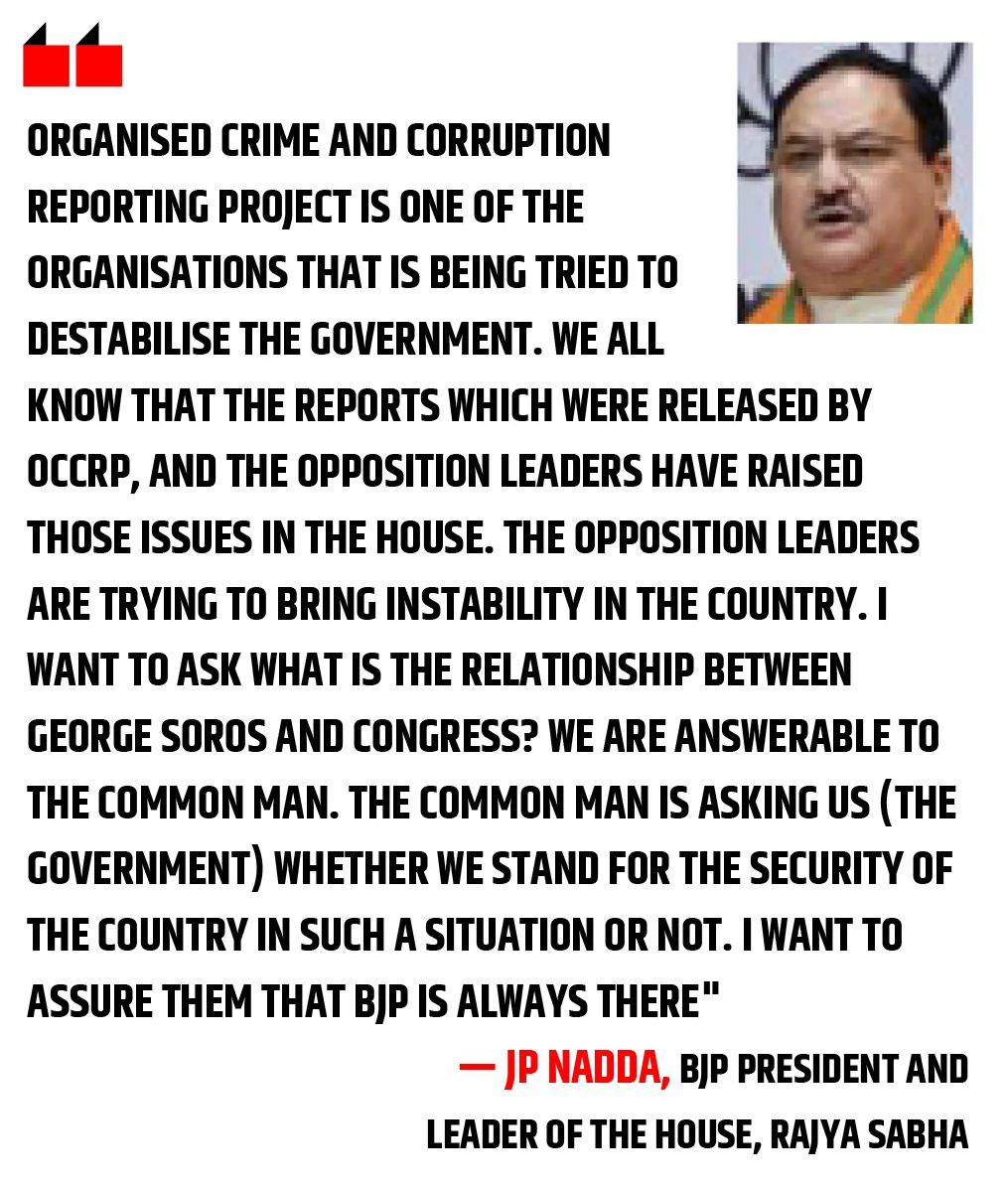
Formation of Rajiv Gandhi Foundation
The assassination of former Prime Minister Rajiv Gandhi on May 21, 1991, was followed just a month later by the establishment of the Rajiv Gandhi Foundation on June 21, 1991, spearheaded by Sonia Gandhi. In 1993, a UK branch of the foundation was established, with the British Government passing a motion recognising it during Sonia’s visit. That same year, she travelled to the United States for Foundation-related work. However, the specifics of this visit remain shrouded in mystery.
Soros’ connection with Nehru-Gandhi family
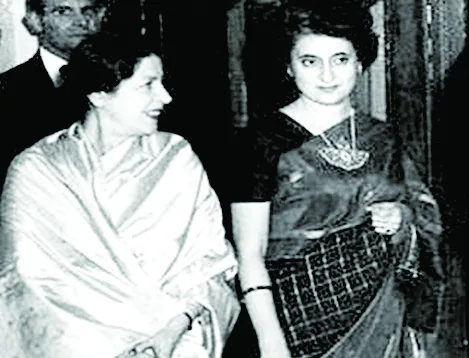
George has connections with the Nehru-Gandhi dynasty. Soros had been ‘good friends’ with Fori Nehru, wife of Indira Gandhi’s cousin brother Braj Kumar Nehru. Both (Soros and Fori) of them were born in the Eastern European country of Hungary. Soros and Fori Nehru had ‘exchanged correspondence’ for several years until he decided to meet her in person in May 2009. At that time, Fori Nehru was 100-year-old. Born in December 1908 in Hungary as Magdolna Friedman, she studied at the London School of Economics (LSE). Fori met her future husband, Braj Kumar Nehru, at the varsity. She was founder of ‘Cottage Industries Emporium’ and led a campaign for employment for refugee women in 1947, as a member of the Emergency Committee for refugees.
Interestingly, 1993 was also the year George Soros launched the Open Society Foundations (OSF) in New York, which would later become synonymous with funding initiatives aimed at “democratic reforms” worldwide.
Several NGOs linked to the Rajiv Gandhi Foundation are associated with Soros-backed initiatives. Organisations like the Human Rights Law Network (HRLN), which have actively supported urban naxals and separatists, reportedly received funding from both the US and Soros. Prominent figures in the National Advisory Council (NAC), formed by Sonia Gandhi to oversee United Progressive Alliance Government, also had links to Soros-funded activities.
According to an RTI report, the Indian Government has no official record of Sonia Gandhi’s foreign travels between 2004 and 2014, the decade when the UPA Government was in power. This lack of transparency raises critical questions about accountability, especially considering that she held one of the most influential political positions in India during this period.
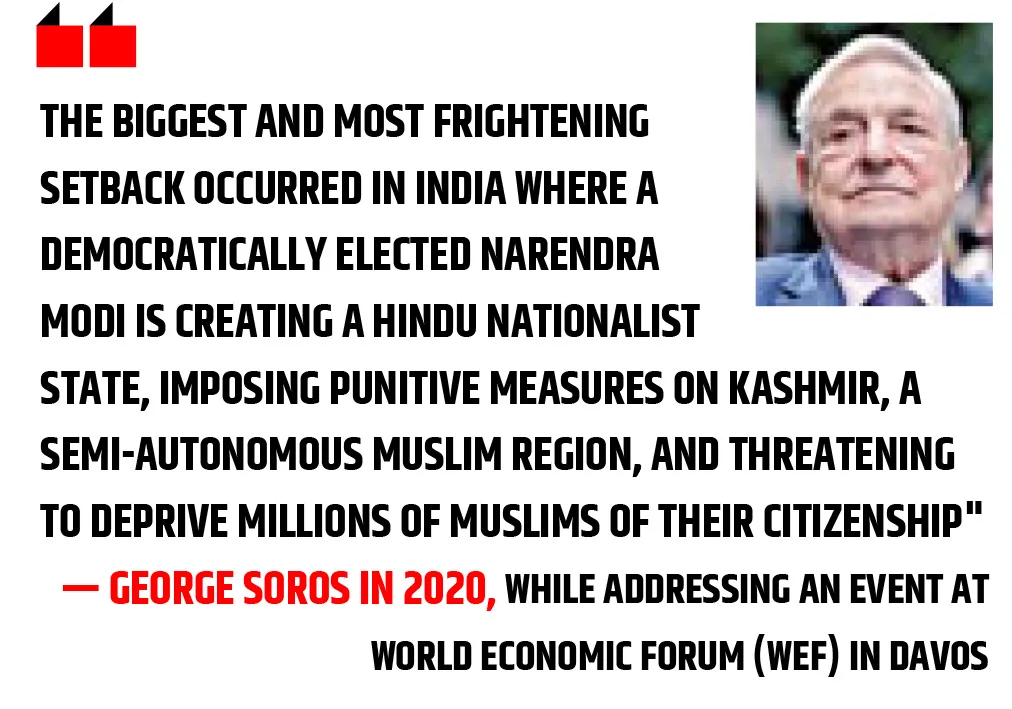
Starting in 2011, Sonia Gandhi reportedly made multiple trips to the United States for “medical reasons.” These trips were acknowledged only by Congress spokespersons, and that too after she had already left the country.
Corroboration by Congress Leader
Notably, Natwar Singh, a close associate of Sonia Gandhi, revealed in 2014 that the US’s Central Intelligence Agency (CIA) had penetrated every sphere of the UPA Government. This statement raises questions about the extent of foreign involvement in Indian policymaking during this period.
The manipulator
- George Soros has financed various political movements in eastern Europe and former Soviet republics
- Soros is the biggest funder of the Democratic Party in American history and backed the presidential bids of Barack Obama, Hillary Clinton and Joe Biden with millions of dollars
- “I am basically there to make money. I cannot and do not look at the social consequences of what I do…I don’t feel guilty. Because I’m engaged in an amoral activity which is not meant to have anything to do with guilt”–George Soros in American TV show ‘60 Minutes, 1998’
- In 2002, Soros was fined $2.8 million by a French court for insider trading
- In 2009, in his native Hungary, Soros had to pay up $2.5 million for illegal manipulation of share prices
- Soros’ first major attack was on the Bank of England. September 16, 1992 – also known as Black Wednesday – which brought down the British pound sterling
- In 2018, Hungary passed “Stop Soros” law, named after George Soros. The new law created a new category of crime, called “promoting and supporting illegal migration” — essentially, banning individuals and organisations from providing any kind of assistance to undocumented immigrants
The timeline of events paints a deeply unsettling picture of interconnected influences—spanning political, financial, and ideological realms—tied to George Soros, Sonia Gandhi, and key international players. From the formation of organisations with controversial objectives to policy decisions that weakened India’s counter-terrorism efforts, the implications of these revelations are profound.
As new connections continue to surface, the intricate ties between Congress leader Rahul Gandhi’s chief advisor Vijay Mahajan, and global networks funded by Ford Foundation and George Soros’s Open Society Foundations demand closer scrutiny. What follows is an exploration of how these relationships shape Indian politics, from protests and leadership training to NGO funding and foreign interference.
The Man in the Shadows: Vijay Mahajan
In Indian politics, few have wielded as much behind-the-scenes influence as Vijay Mahajan. Currently serving as Rahul Gandhi’s chief advisor and CEO of the Gandhi family’s flagship NGO, the Rajiv Gandhi Foundation. Vijay Mahajan is the mastermind behind the Rahul’s much-publicised Bharat Jodo Yatra, a PR exercise aimed at revamping his political image.
Mahajan is not a lone operator. His close collaborator, Yogendra Yadav, plays a pivotal role in coordinating political strategies. Together, they have been linked to organising large-scale protests, such as the farmers protests that dominated headlines in recent years. These movements, ostensibly grassroots, have faced allegations of being part of a larger “regime change” strategy.

Vijay Mahajan’s connections extend beyond Indian borders. He is a product of the Ford Foundation, a US-based organisation often gaining geopolitical interests through funding and partnerships. Ford Foundation funded both Vijay Mahajan and Mohammed Yunus, a Bangladeshi economist and Nobel laureate and was also behind the changed regime of Bangladesh through undemocratic means.
When Yunus faced legal challenges in Bangladesh, Mahajan, alongside former Ford Foundation trustee signed a letter in his defence. This incident underscores the deep camaraderie within the Ford Foundation’s network and its ability to mobilise global support for its members.
Intriguingly, Rukmini Banerji, a founding trustee of IPSMF, also serves as vice chairperson of PRADAN, an NGO co-founded by Vijay Mahajan and a Ford Foundation officer, Deep Joshi, in 1982. PRADAN receives significant funding from the CIA affiliated Ford Foundation and other U.S.-based entities, raising eyebrows about the scale and intent of foreign involvement in Indian’s civil society.
Mahajan’s ventures are not limited to NGOs. He founded BASIX, a microfinance institution not just heavily funded by Ford Foundation but also partnered with it and other agrochemical giants like Bayer and Monsanto. While Vijay Mahajan and his allies claim to champion farmers’ rights but cleverly hide their involvement of foreign agribusiness corporations.
These organisations exploit farmers for corporate gain while portraying themselves as allies of rural India. Meanwhile, families of individuals like Mahajan enjoy privileged lifestyles abroad.
Scrutinising Role of Ford Foundation & CIA
The Ford Foundation’s connections to American intelligence agencies, particularly to the CIA, have long been a subject of discussion. A leaked CIA document revealed that the Bharatiya Janata Party has been under US surveillance since 2010, while Congress and other parties have been conspicuously absent from similar scrutiny. This revelation concluded that Ford Foundation and affiliated entities operate as tools of psychological warfare and influence in India.
The influence of the Ford Foundation extends beyond the Congress Party. Its funding and networks are linked to Leftist and Islamist leaders who are reportedly unaware of the extent to which their activities are shaped by foreign agendas. Vijay Mahajan, Yogendra Yadav, and their affiliates have been managing these ecosystems, creating a unified front to challenge the BJP and other nationalist movements.

The recurring presence of entities like the Ford Foundation, the Rockefeller Foundation, and George Soros’s Open Society Foundations in Indian political discourse points to a larger pattern of influence. These organisations have been funding individuals and NGOs that align with their broader geopolitical goals, raising concerns about sovereignty and accountability.
As the connections between Rahul Gandhi, Vijay Mahajan, and global networks come to light, a troubling picture emerges of foreign influence in Indian politics. From NGO funding to media narratives, the reach of these networks extends into critical spheres of governance, activism, and public perception.
Digvijay Singh and the Behar Family
Over the years, Congress leader Digvijay Singh has become a controversial figure in Indian politics. While his electoral relevance has waned, his proximity to the Gandhi family and Congress leadership remains intact. Despite his penchant for controversial remarks—like blaming the RSS for the 26/11 Mumbai terror attacks and diverting attention from Pakistani terrorists—Digvijay Singh continues to be a prominent voice in Congress circles. But his connections run deeper than public statements, tied to a network of individuals and organisations that wield influence far beyond India’s borders.
One key figure in this nexus is Sharad Chandra Behar, Digvijay Singh’s advisor during his tenure as Chief Minister of Madhya Pradesh. What emerges from an exploration of Behar’s connections is a troubling web of NGOs, global financiers, and alleged agendas that reach from India’s grassroots to international power players like George Soros and the Ford Foundation.
Sharad Behar’s NGOs, along with those led by his sons, have received funding from the Ford Foundation and Soros-affiliated organisations. This financial support raises questions about the intent behind these funds, especially given the recurring themes of opposition to Indian economic and national interests.
Foreign Influence, Crony Capitalism & NGO Activism
Over the course of our investigation, we have meticulously unravelled the deep-seated connections between Congress leadership, foreign entities, and their collective efforts to destabilise India. Now, we turn to a critical layer of this nexus: how foreign influence, coupled with Indian crony capitalists and NGOs masquerading as activists, works to serve anti-India forces under the guise of altruism. One key avenue of this influence is ‘Project Syndicate,’ an expansive network of media outlets backed by foreign financiers with a vested interest in shaping global narratives.
Exposing ‘Project Syndicate’
In May 2024, The Guardian published a scathing article against Prime Minister Narendra Modi and Home Minister Amit Shah, portraying Shah as a figure who thrives on fear and alleging authoritarian tendencies in Indian governance. This article, far from being an isolated opinion piece, is part of a broader propaganda campaign. The Guardian is a partner of Project Syndicate, a network of 506 media outlets spanning 156 countries. This initiative is funded primarily by George Soros and Bill Gates, whose evil design against India have often raised questions.
The Soros Think Tank Connection
Soros expanded his influence by establishing the Institute for New Economic Thinking (INCT) in 2009, an organisation with ties to prominent global institutions, including Cambridge University—where Rahul Gandhi delivered a speech in March 2023.
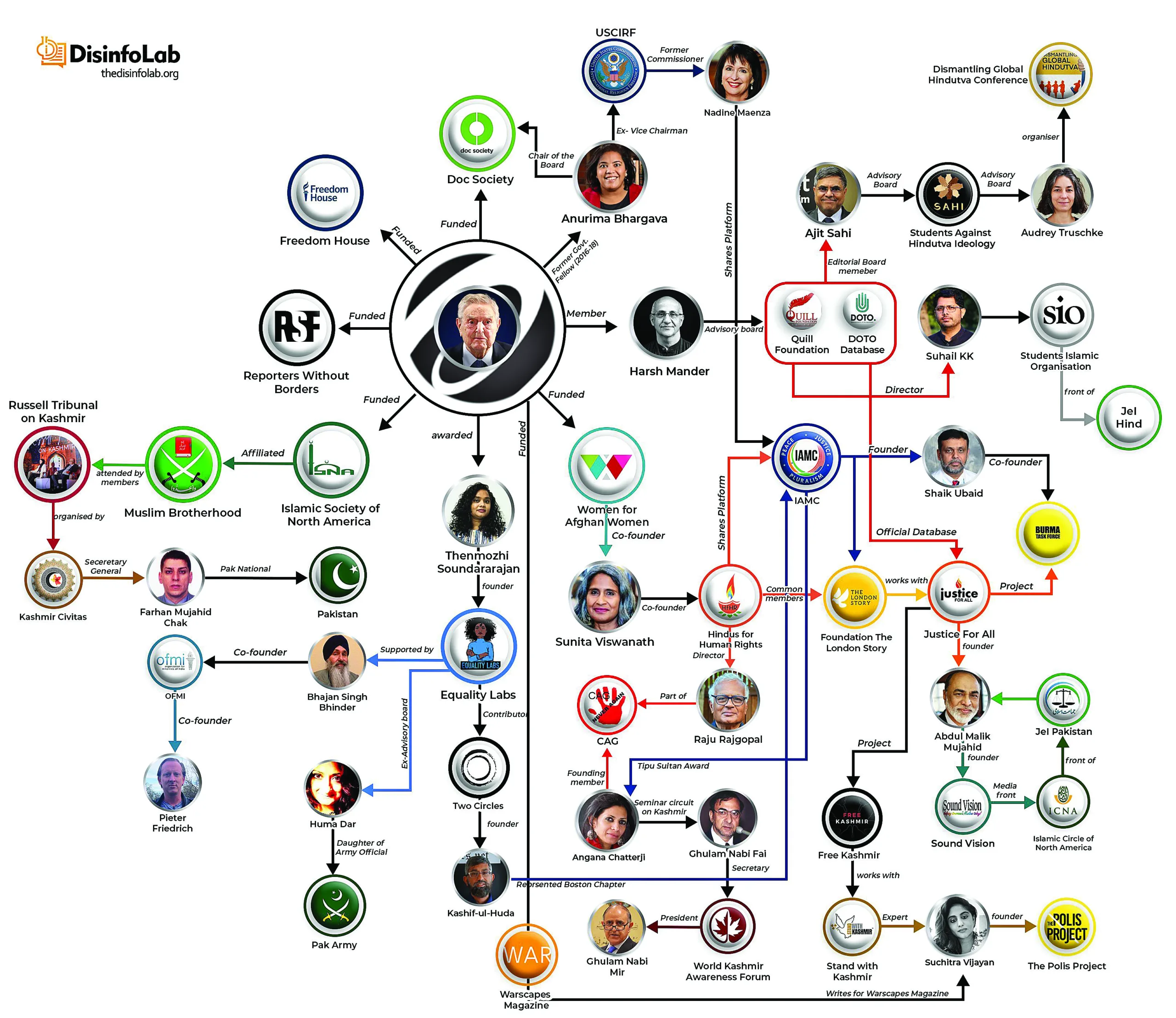
Rob Johnson, president of INCT, is a former Managing Director of Soros Fund Management. Johnson is notorious for his role in the infamous “breaking of the Bank of England,” an event eerily similar to the economic destabilisation attempts seen in India with the Adani Group.
Prominent names in INCT include:
Raghuram Rajan, a regular figure in Soros-funded initiatives., Jayati Ghosh, who contributes extensively to Soros-backed narratives.
The Delhi Riots and NGO Influence
Jayati Ghosh’s name surfaced in the Delhi Police chargesheet on the 2020 riots, highlighting her alleged role in instigating violence. Yet, despite these accusations, her NGO continues to receive crores in funding from global entities like Soros and the Ford Foundation.
Regime Change and Anti-India Agendas
The overarching objective of this ecosystem is clear: regime change in India. Soros, Gates, and their network of NGOs, think tanks, and media outlets have consistently targeted India’s leadership and its economic growth. The intricate nexus of foreign influence, Indian crony capitalism, and activist NGOs presents a significant threat to India’s sovereignty. Entities like Project Syndicate, the Ford Foundation, and individuals like George Soros and Jayati Ghosh operate under the guise of philanthropy and academic inquiry but work toward destabilising India from within. The answer, as we unravel, is far from simple. Beneath the surface of this conflict lies a sinister web of foreign interference, drug cartels, and political complicity. The epicenter of this chaos involves one man whose influence knows no borders—George Soros—and his nexus with local and international actors.
Congress-Soros Nexus
The involvement of Congress in this saga cannot be ignored. When Sonia Gandhi herself served as co-president of Soros-backed think tanks and when her close aides like Harsh Mander work directly with Soros’s organisations, the connections become undeniable.
Salil Shetty, Vice President of Soros’s Open Society Foundations, was recently seen walking alongside Rahul Gandhi during his Bharat Jodo Yatra. Such associations raise critical questions about the Congress party’s proximity to Soros and their shared interests in destabilising India.
Media Complicity Around Soros
Despite Soros’s notorious track record as a drug financier and regime changer, Indian mainstream media has largely remained silent. Not a single journalist has dared to confront the Gandhi family about their ties to Soros. When media outlets like The Caravan and The Wire amplify Soros’s propaganda, it’s clear that the agenda is to push India toward instability.
Troubling Pattern
The connections we’ve explored reveal a troubling pattern: foreign players, political interests, and powerful elites working together to destabilise India from within.
Soros’s influence spans continents, destabilising Governments, profiting from chaos, and funding narratives under the guise of human rights and activism. In India, his ties with key players like Congress, Ford Foundation, and organisations linked to the Gandhis raise serious questions about their motives. At the heart of this saga lies one fundamental truth: India must remain vigilant against forces that seek to undermine its sovereignty. The nation must prioritise transparency, accountability, and decisive action to counter these threats—because its unity and future depend on it.



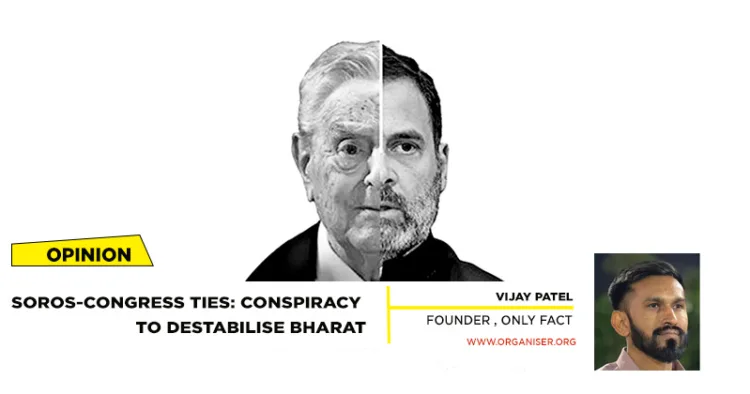















Comments